Asia University invited seven professors and experts from Harvard Univ., the Univ. of Missouri, AU, etc. to explore how to make use of AI and blockchain technologies to combat fake news.
A lot of fake news that flood the Internet and become increasingly prevalent all over the world could provide false information to everywhere. Asia University (AU) held the 2019 Workshop on Artificial Intelligence and Blockchains for Fake News on July 29. In this workshop, seven professors were invited to join a forum, including Prof. Urs Gasser from Harvard University, Prof. Michael Kearney from the Missouri School of Journalism at the University of Missouri, and Prof. Chi-Ren Shyu from the Informatics Institute at the University of Mossouri. For the phenomenon of fake news prevalence, the workshop has held a forum to discuss on how to effectively combat fake news as well as disinformation from the perspectives of laws, communication, and information technology. Prof. Michael Kearney pointed out the fact that AI could help fact checkers to identify fake news is an important research topic at present. He hoped that better results of fake news detection could be achieved by the cooperation of human efforts and machine assistances.
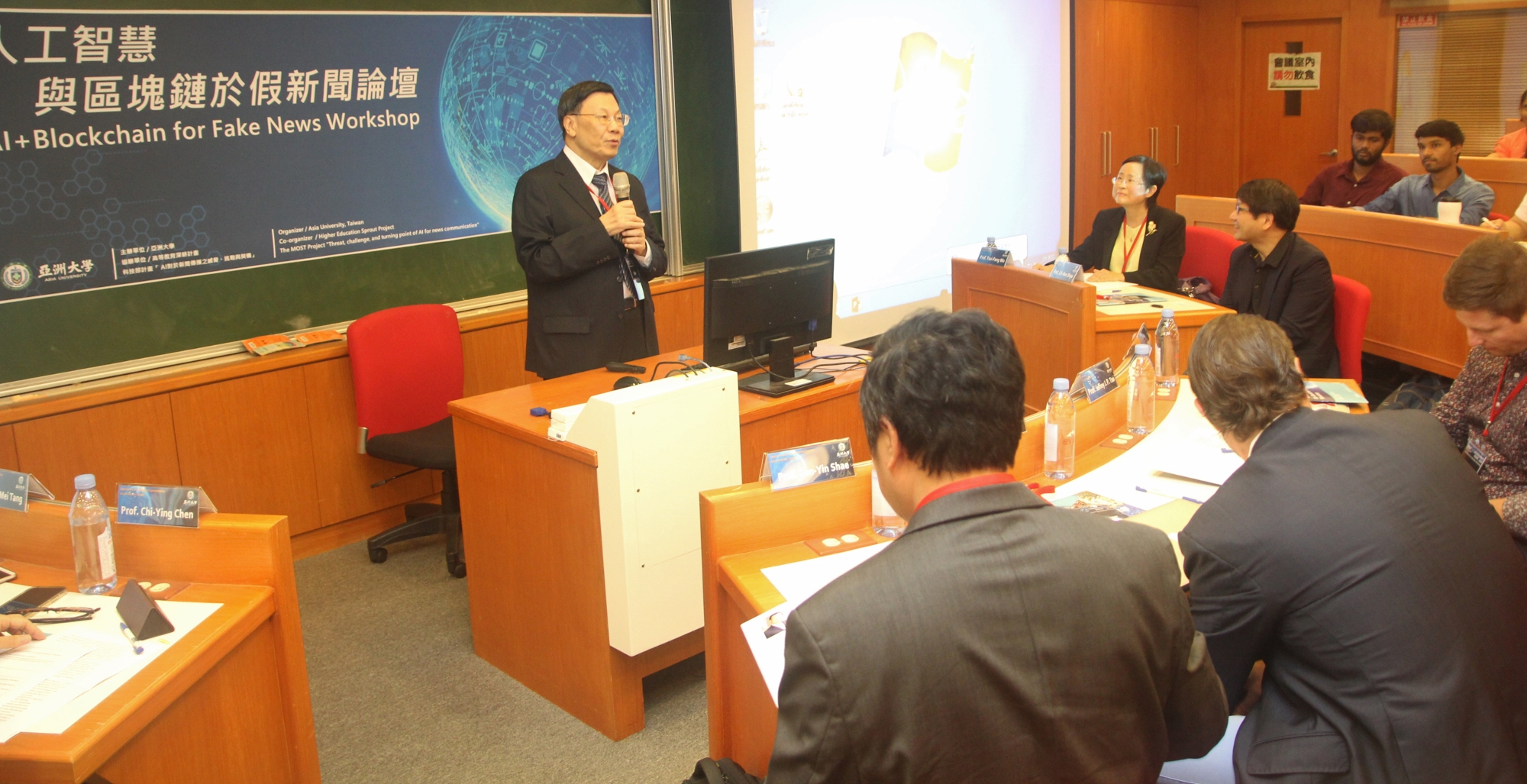
Asia University (AU) President, Jeffrey J. P. Tsai held the 2019 Workshop on “Artificial Intelligence and Blockchains for Fake News” and gave a welcome speech.
At the opening ceremony, AU President, Jeffrey J. P. Tsai, gave a welcome speech, in which he mentioned that AU is committed to promoting AI programs in education, and AU faculty members and students have developed many AI applications. One of them can be used to detect a person’s facial expression, by which a person in doubt may be monitored and prevented from indulging in internet addiction. Another application can distinguish whether the place of production of a local tea product in Taiwan, the Oriental Beauty Tea, is true or not, by which tea farmers’ sales of their real tea products can be ensured. As to humanistic literacy, aesthetics and cross-disciplinary learning abilities which cannot be replaced by AI, President Tsai said that AU has also strengthened related education and worked hard for the goal of cultivating students with strong background both in humanity and sci-tech.
“Is much information a good thing?” asked Prof. Urs Gasser, the Executive Director of the Berkman Center for the Internet and Society at Harvard University. “In the US, we focused on the importance of freedom of speech; some people think that plenty of information is definitely positive even if the context contains false ingredients, although this concept is quite controversial,” said Prof. Urs. He also mentioned that most news was provided by professional journalists in the past and its quality is easy to check; however, everyone now can spread news from online social media platforms quickly without being verified. In order to manage fake news effectively, a solution to stop the spread of fake news is to combine the uses of legal developments, science and technology assistances, propaganda by education, etc.
Dr. Michael Kearney teaches at the School of Journalism at the University of Missouri, and his research aims to analyze social media contents and communication by computerized methods. On the topic of “Fake News on Social Media,” Prof. Kearney mentioned in the workshop that fake news accounted for nearly 6% of all posts on Twitter, which is a very high proportion, and that in for-profit journalism systems, fake news has been released intentionally and continuously as a result of the decentralization of journalism generated by the social media with complex background reasons. “The intention behind the fake news is still difficult to judge only by AI,” said Prof. Kearney.
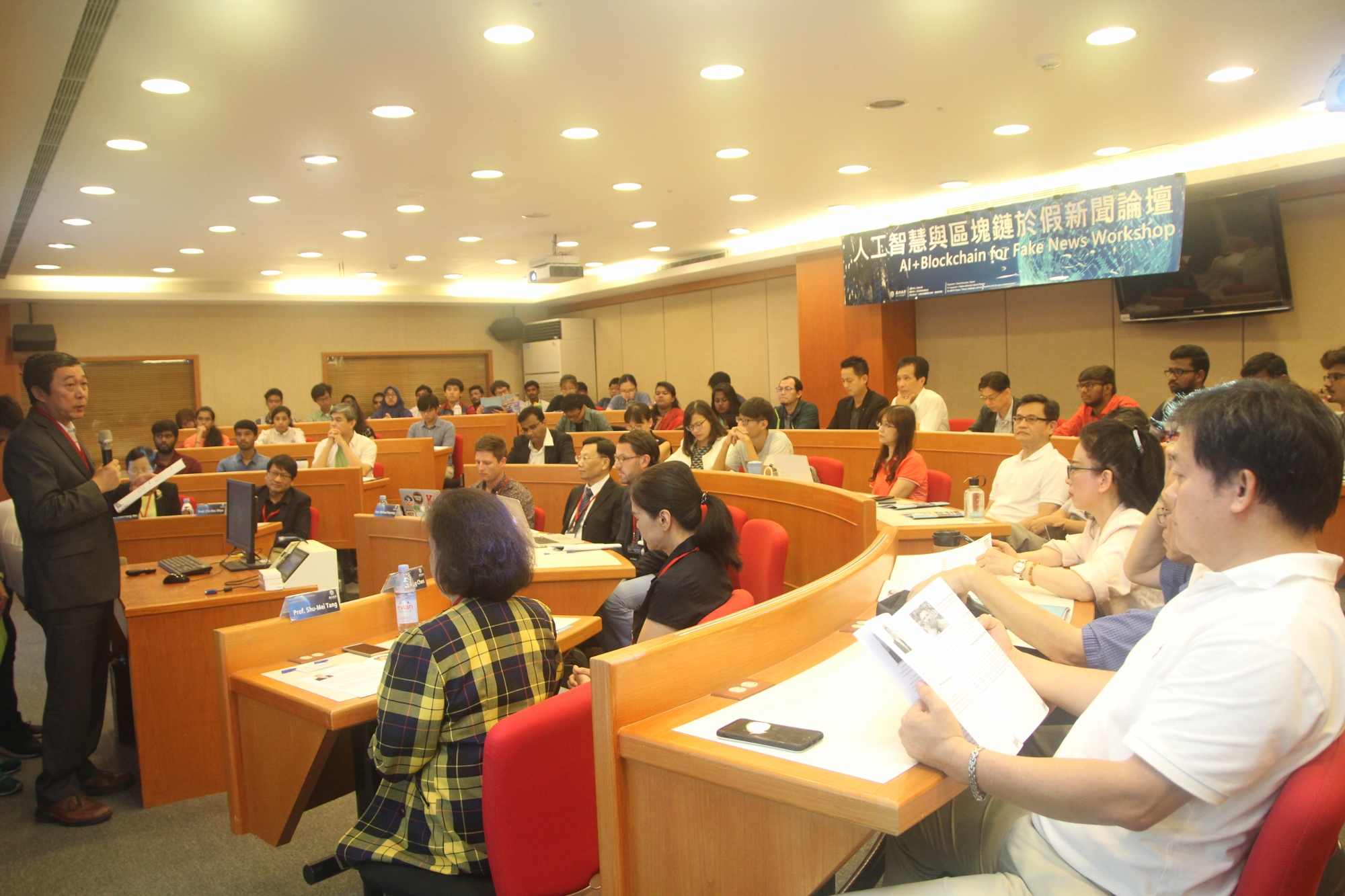
The 2019 Workshop on “Artificial Intelligence and Blockchain for Fake News” was held in AU, and Prof. Zon-Yin Shae was a keynote speaker.
Another participant of the workshop, Prof. Chi-Ren Shyu comes from the Informatics Institute at the University of Missouri, who has specialty in the fields of blockchains, big data analytics, biomedical informatics, mobile healthcare and e-health, visual knowledge reasoning, and search engine design, and has published more than 140 papers and is responsible for a number of US federally-funded big data AI projects. He pointed out that unreal medical information leads to wrong behaviors and even affects the human life or leads to deaths. He said that he is working on the establishment of a comprehensive knowledge database which combines multiple real-world information sources with artificial intelligence methods, and can be used to identify various levels of fake medical news related to drugs and medical devices.
Prof. Zon-Yin Shae, a chair professor of AU, Prof. Chi-Ying Chen, an associate professor of the Department of Information Communication at AU, and Prof. Shu-Mei, Tang, the head of the Department of Financial and Economic Law at AU, are now jointly carrying out a “humanities via AI” project supported by the Ministry of Science and Technology of Taiwan entitled “Artificial Intelligence for the Threats, Challenges and Opportunities of News Communication.” The current results found in this project has also been reported in the forum in this workshop by these three professors.
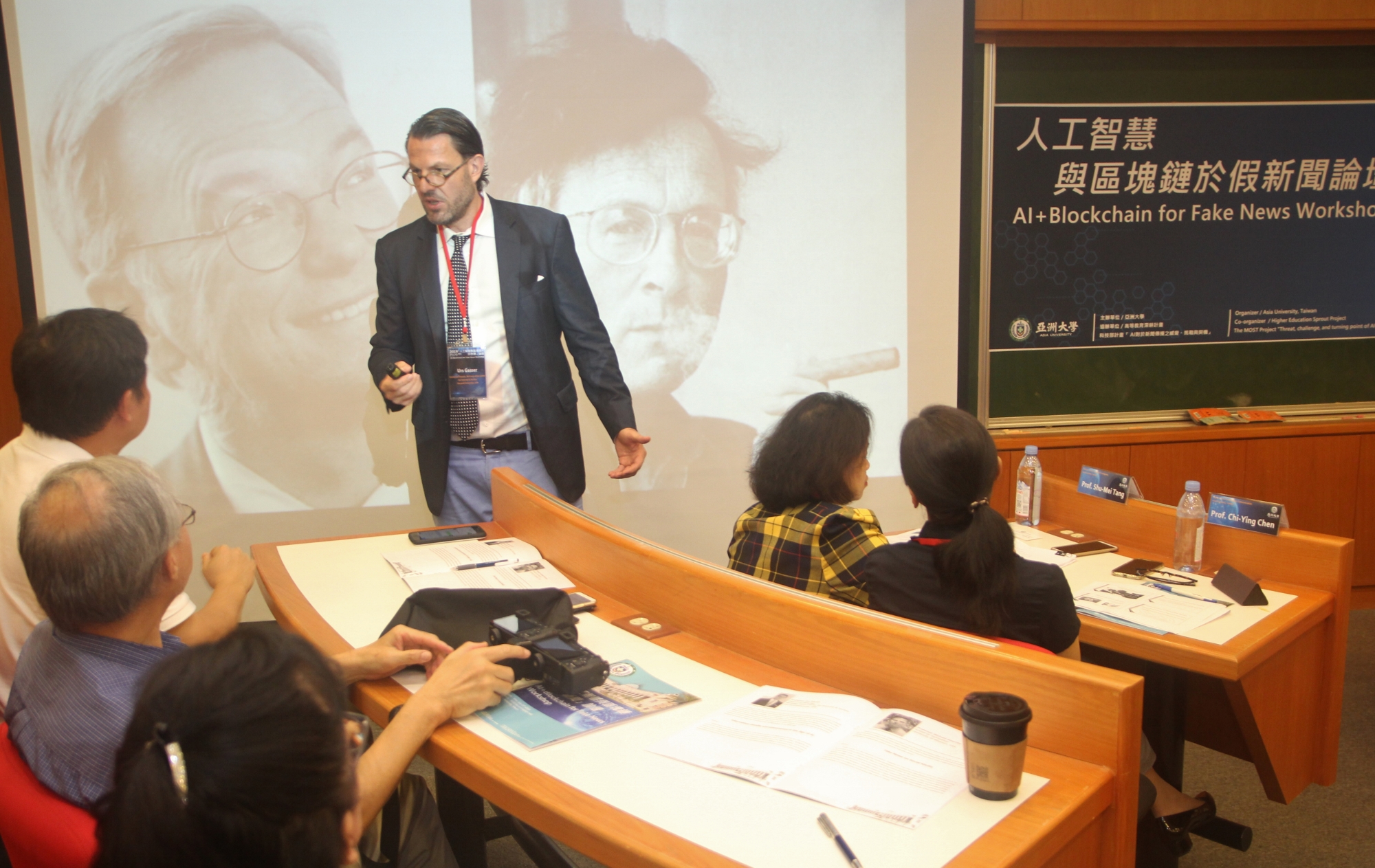
In the 2019 Workshop on “Artificial Intelligence and Blockchains for Fake News,” Prof.
Urs Gasse, the Executive Director of the Berkman Center for the Internet and Society at Harvard University, gave a keynote speech.
Prof. Shae, who is also the Director of the Artificial Intelligence Center at AU, pointed out that Internet giants such as Facebook, Google, and Twitter are all devoted currently to developing AI techniques to detect fake news, but the correct rates yielded by their projects are unsatisfactory. So far, fact-checking agencies detect fake information by human resources, and this might be the most accurate way to prove false news at present. However, the manpower is insufficient, and the verification work is a big challenge. To improve the accuracy of information verification, Prof. Shae’s research is to develop a mechanism for assessing the truth of a message by weighting a variety of factors, including information provided by fact check experts, outputs yielded by AI techniques, parameters offered by crowd sourcing, etc. This will help promoting the efficiency of human fact checkers in the effort of detecting fake news.
Prof. Chi-Ying Chen, who is an associate professor of the Department of Information Communication at AU engaging in the research areas of communication behaviors and effects, information communication cultures, media and societies, etc., said in the forum that a lot of countries in the world have invested considerable efforts to explore how to effectively detect fake news, expecting to prevent harmful effects at the beginning, but everyone involved in this work seems to ignore discussions on the core issues of personal behaviors, for example, what factors make people easy to believe in false information. In addition, Prof. Chen explored the effects of the central and peripheral route based on the theory of the elaboration likelihood model (ELM), from which research results may provide a useful reference for the development of fake news detection by AI.
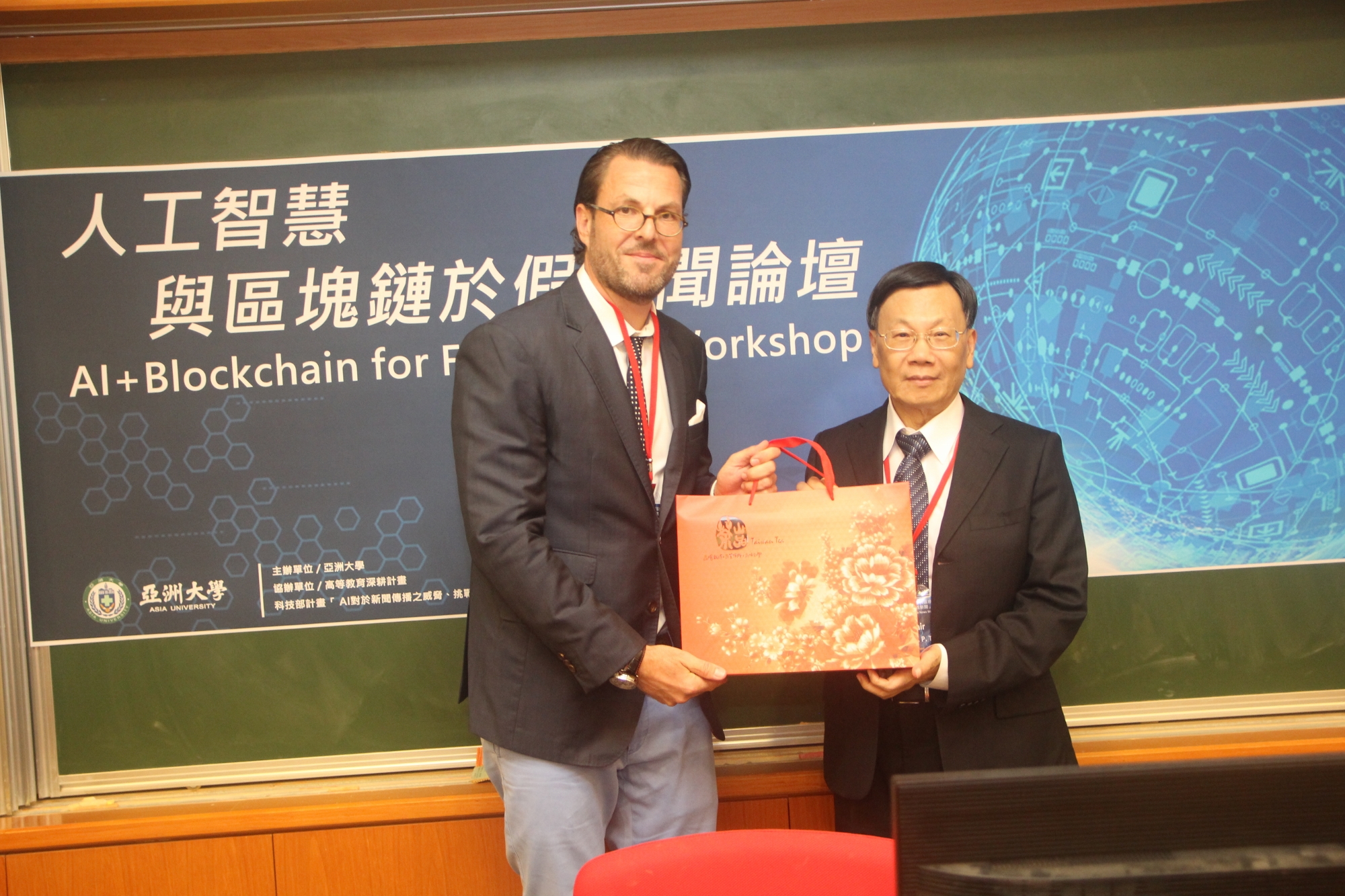
AU President, Jeffrey J. P. Tsai, presented a gift to Prof. Urs Gasse, the Executive Director of the Berkman Center for the Internet and Society at Harvard University.
One more participant in the workshop, Prof. Shu-Mei Tang, the Head of the Department of Financial and Economic Law at AU, pointed out that while cracking down on fake news, the freedom of speech might be hurt simultaneously; therefore, the aim of her research is to define the meaning of false news and propose plans to combat fake news from social, political and legal aspects. “In the meantime, the freedom of speech should be protected to prevent the human right from being improperly violated,” said Prof. Tang.
In addition, Ms. Cui-Fang Wu, a procurator of the Taichung Branch of the Taiwan High Prosecutors Office, also introduced the current legislative progress on establishing new laws related to fake news in Taiwan. She indicated the importance to educate the public about potential damages that fake news can cause in the forum.
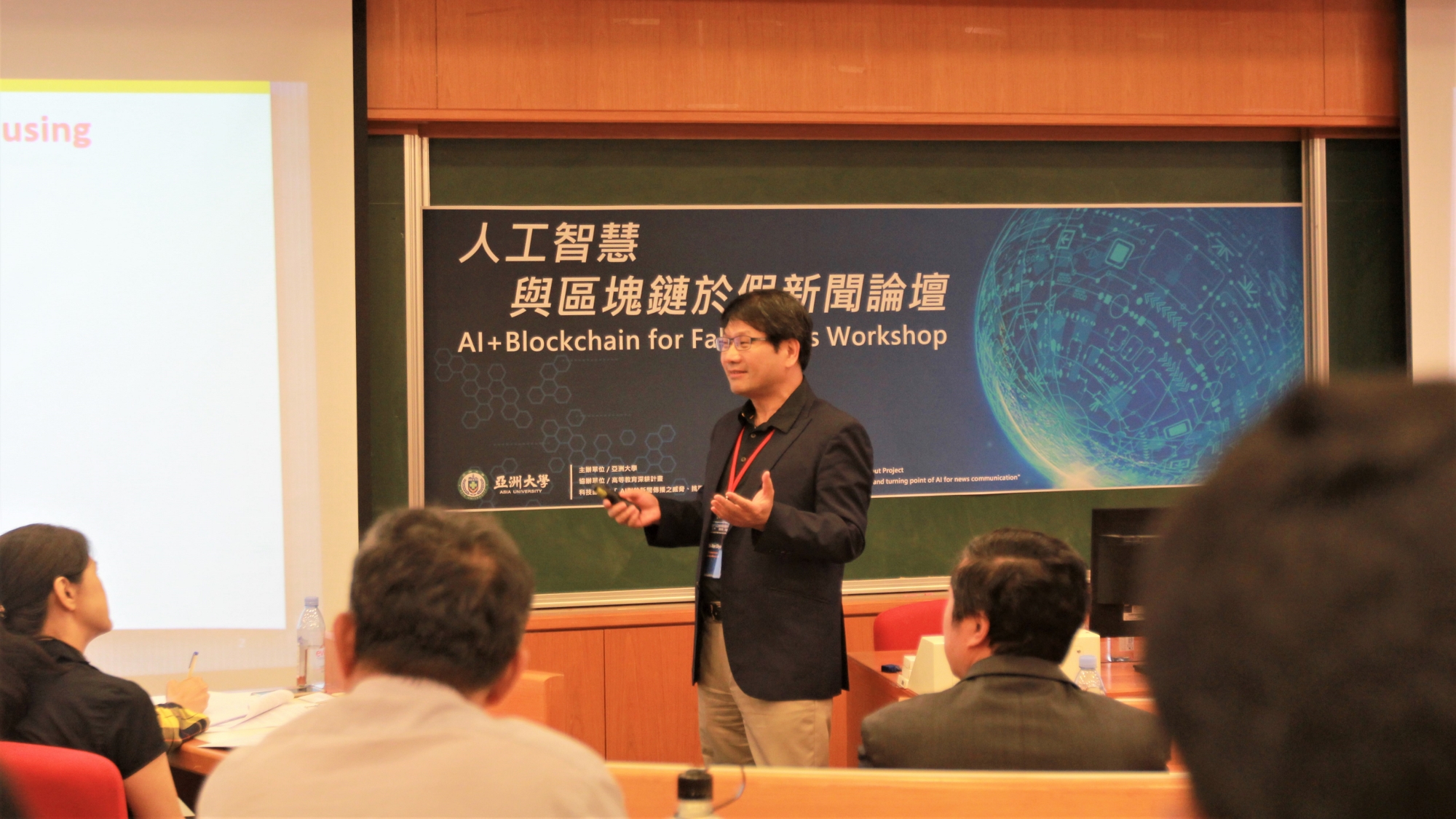 |
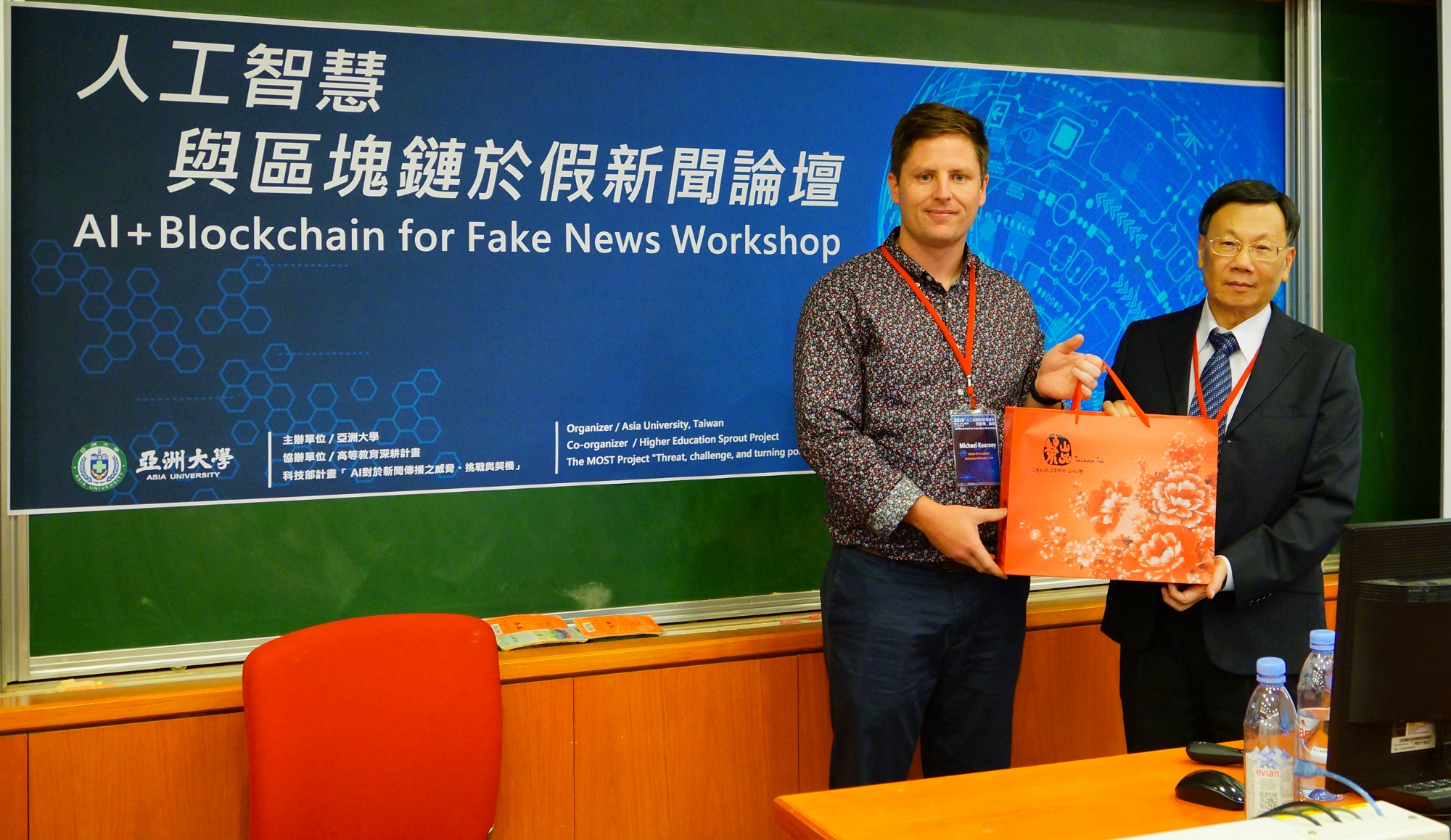 |
| Prof. Chi-Ren Shyu from the Missouri School of Information gave a speech in the 2019 Workshop on “Artificial Intelligence and Blockchains for Fake News” held at AU. | AU President, Jeffrey J. P. Tsai, presented a gift to Prof. Michael Kearney from the Missouri School of Journalism. |
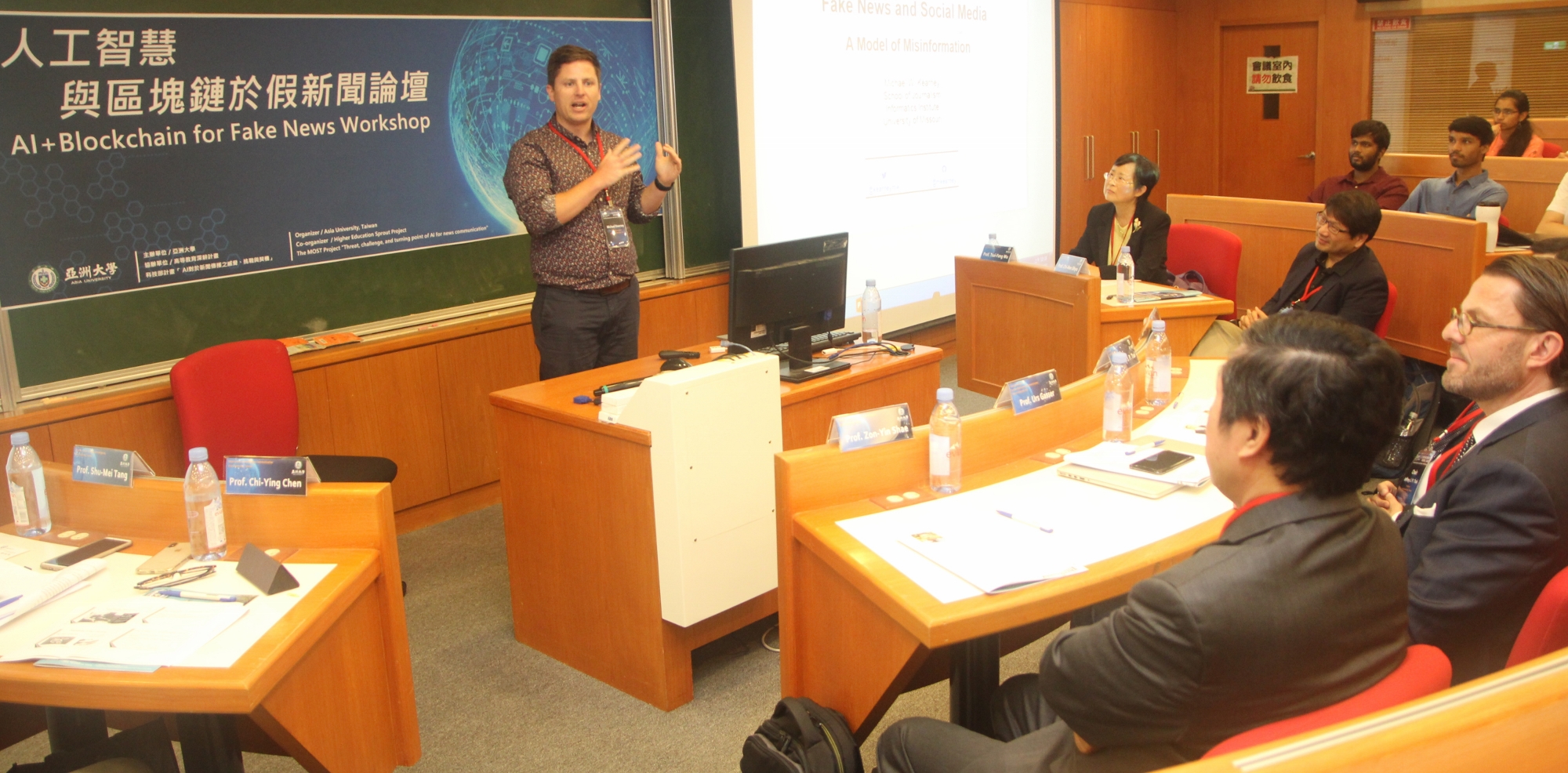 |
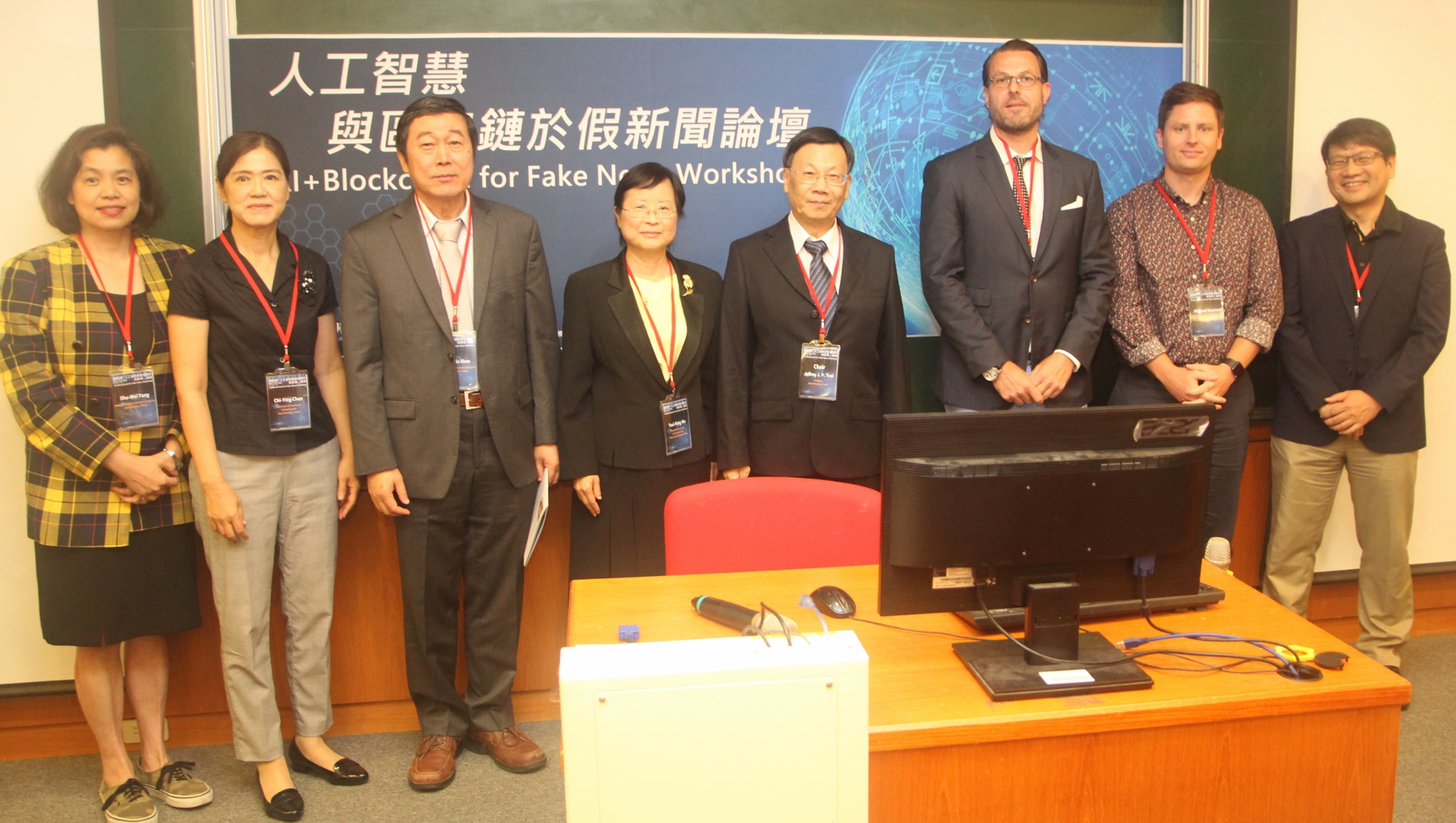 |
| Prof. Michael Kearney from Missouri School of Journalism gave a speech in the 2019 Workshop on “Artificial Intelligence and Blockchains for Fake News.” | At the end of the 2019 Workshop on “Artificial Intelligence and Blockchains for Fake News,” AU President, Jeffrey J. P. Tsai took a group photo with Prof. Urs Gasser from Harvard University, Prof. Michael Kearney from the University of Missouri, Prof. Chi-Ren Shyu, Prof. Zon-Yin Shae, Prof. Chi-Ying Chen, and Prof. Shu-Mei, Tang from AU. |

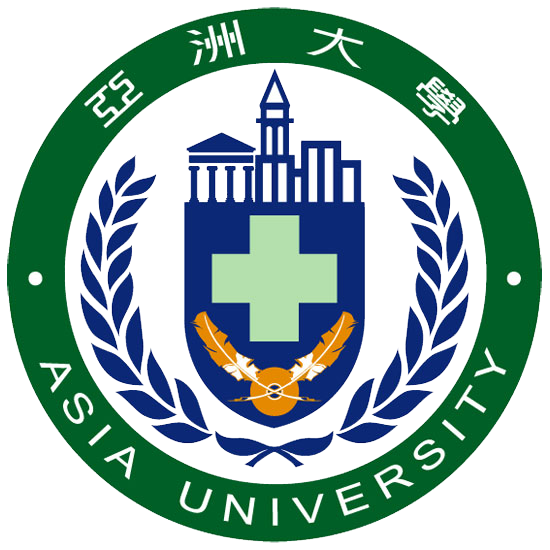 OFFICE OF ACADEMIC AFFAIRS-Student Internship and Learning Guidance Division
OFFICE OF ACADEMIC AFFAIRS-Student Internship and Learning Guidance Division
